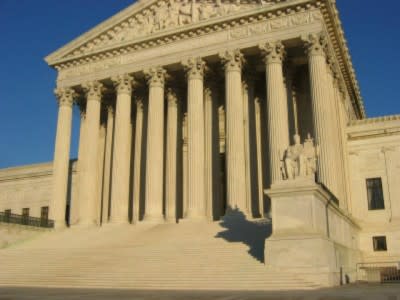Watch remains on for two major Supreme Court cases this week
As the Supreme Court heads toward the end of March, two big cases from last year involving the diplomatic recognition of Jerusalem and free speech on Facebook seem imminent.
Last week, the Court decided two other significant cases from last fall involving redistricting in Alabama and a pregnancy discrimination claim against UPS. Both cases were remanded back to lower courts for retrial.
But the two marquee cases from late last year remain unannounced. The Zivotofsky case involves a dispute between Congress and the President over which government branch can diplomatically recognize Jerusalem; the Elonis case seeks to define the difference between protected free speech and threats on Facebook.
The Supreme Court said Friday that it will hand down more opinions in argued cases this Tuesday. And based on patterns from the past two years, it seems to be a matter of time as to when these two cases are announced.
Last year, the Justices surprised by some observers by sitting on two big cases in March 2014 that had been argued in October 2013: McCutcheon v. Federal Election Commission and Schuette v. Coalition to Defend Affirmative Action.
The McCutcheon decision eventually came down on April 2, 2014, and it overturned limits on aggregate federal campaign contributions. Three weeks later, the Schuette decision held that bans on affirmative action programs were permissible through a state amendment. Both decisions were among the biggest cases decided in the 2013 term at the Court.
By this time in March 2013, the Court had already decided three high-profile cases from the 2012 term: Florida v. Harris, Clapper v. Amnesty International and Florida v. Jardines.
Here is a brief look at the Zivotofsky and Elonis cases.
Zivotofsky v. Perry (argued Nov. 3, 2014) involves 12-year-old Menachem Binyamin Zivotofsky. Menachem’s parents are American citizens, and Menachem was born in Jerusalem.
Citing a 2002 law passed by Congress and signed by President George W. Bush, with reservations, the Zivotofskys asked the State Department for a passport for Menachem when he was two-months-old that listed “Jerusalem, Israel,” as his birthplace. The State Department refused to add the word “Israel” to Menachem’s passport, and the dispute has been in the legal system since them.
The direct constitutional issue is Zivotofsky is the question of which branch of government controls all, or at least most, of the foreign policy decisions in Washington.
The direct political issue is the current United States foreign policy of it not recognizing Jerusalem as part of Israel. A Court ruling that would favor Congress could be interpreted overseas as a de facto American recognition of Israel’s claim to Jerusalem, which would have major policy consequences.
Elonis vs. United States (Dec. 1, 2014) is a case originating near Bethlehem, Pennsylvania. Anthony Elonis is challenging a 44-month prison sentence for posts on Facebook that appeared to threaten his wife with violence, including statements made by Elonis online after he was served with a protection-from-abuse order.
Elonis believes that the lower court that convicted him should have been presented with direct evidence proving that Elonis made the statements with the intention of harming their recipients. Elonis claimed he made the statements as therapeutic works of art, in the form of rap lyrics, and he never intended to harm anyone.
The decision in the case could have a lot to say about the First Amendment in the age of Facebook.
After this Tuesday, the Court’s calendar then shows the Justices taking a two-week break from announcing opinions. That is always subject to some change, but the next time the Justices will hear arguments will be April 20.
Recent Constitution Daily History Stories
10 ways Abraham Lincoln remains in our daily lives
Constitution Check: Is the Supreme Court promoting race bias in election districting?
Podcast: The Confederate license plate debate
Can a President really by censured? The answer is Yes and No



